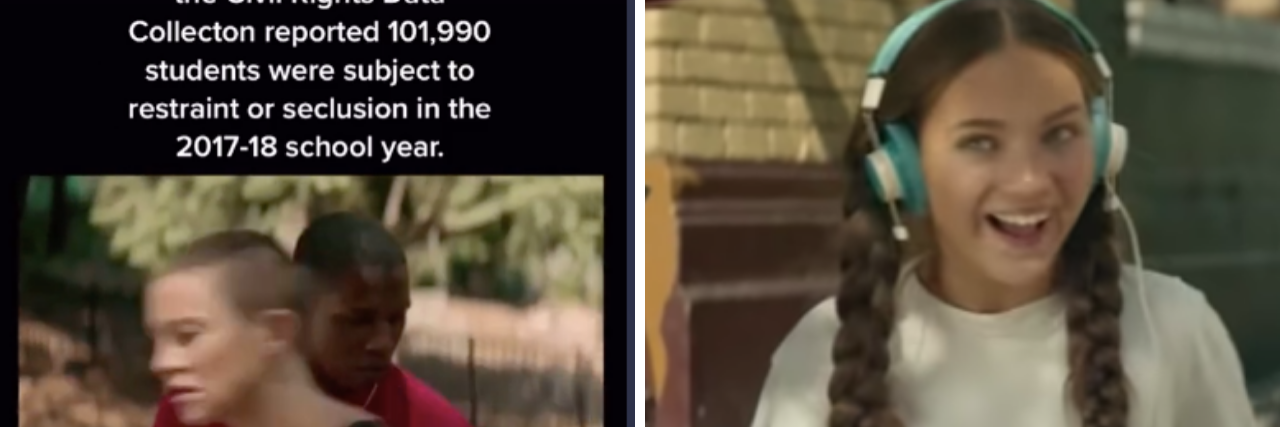Sia Addresses Depictions of Lethal Restraint During Autistic Meltdown in 'Music'
Editor's Note
The following article includes descriptions and depictions of restraint that may be triggering to people in the autism and disability communities.
Update: On Tuesday, after “Music” was nominated for two Golden Globe awards, Sia again took to Twitter to address the autistic community’s concerns about the film. According to tweets captured by Variety and other news outlets, Sia said she had been “listening” and indicated “Music” would include a disclaimer stating the movie does not condone the use of restraint on autistic people. The restraint scenes will be removed in future editions of the movie. “I listened to the wrong people and that is my responsibility, my research was clearly not thorough enough, not wide enough,” Sia said. Her Twitter account was deleted about an hour after posting these messages. “Music” is slated for release on Feb. 10.
As Sia retweets positive reviews, the autism community is taking her upcoming movie “Music” to task again, this time for showing a type of restraint used on autistic people that can lead to death.
Two leaked video clips from Sia’s upcoming film about an autistic girl surfaced thanks to TiKTok user @auteach. The clips are from “Music,” a feature film in which newly sober Zu (Kate Hudson) finds herself the sole guardian of her autistic teenage half-sister Music (Maddie Ziegler). In each of the leaked clips, Music’s caregivers restrain her during a meltdown. It’s unclear (and unlikely) the film critiques this use of restraints.
In one clip, Ebo (Leslie Odom Jr.) carries Music over his shoulder before holding her down on the floor. In another scene at a park, Zu forces Music onto the ground face down in a prone restraint, a dangerous restraint that can cause suffocation and death. For autistic students and students with disabilities, the experience can also lead to post-traumatic stress disorder (PTSD) and other mental health conditions.
(CW: Autistic meltdown and restraint.)
@auteachPlease share widely, boycott this movie and watch to the end for call to action.♬ original sound – Autism Education ✨ Robin
As autistic advocates pointed out, the prone restraint has led to countless deaths among autistic students. However, restraint use is still common in (and out) of school settings. According to data from the 2017–18 school year, more than 100,000 students in the U.S. were disciplined with seclusion or restraint, 78% of whom had disabilities. Black and brown students also experienced seclusion and restraint at disproportionate rates.
Despite its frequent use, restraint is not effective, especially during an autistic meltdown. Strategies such as giving people space, removing extra sensory stimuli, allowing for stimming and using safe tools for regulation, like a weighted blanket or watching a soothing video, go a long way, as well as identifying triggers ahead of time.
“A meltdown is not a tantrum. It’s not something we can control,” explained Mighty community member Aime, adding:
What’s helpful is just sitting quietly and waiting for us to work through it. No talking. Make sure we are safe, but allow us to work through it. You cannot force us out of a meltdown. It only makes it hurt more. I think something that neurotypicals don’t understand is that meltdowns hurt. Physically and emotionally.
“Music” already experienced backlash from the autistic community for Sia’s choice to cast 18-year-old “Dance Moms” star Ziegler, a non-autistic person, to play a non-speaking autistic girl in the film. In response, Sia defended her decision, saying it would have been “cruel” to cast an actually autistic actor. Along the way Sia also directly insulted an autistic actor and called for people to watch the film before judging.
Members of the autism community and their allies are calling for people to boycott “Music,” which is scheduled to be released Feb. 10. TikTok user @auteach also encouraged people to contact their Congressperson to advocate for the Keeping All Students Safe Act. The bill was introduced in Congress in November 2020 to end dangerous restraint practices in schools.
“Restraint and seclusion are traumatic and dangerous practices that harm students with disabilities every day. Every student has the right to be safe at school,” Julia Bascom, executive director of the Autistic Self Advocacy Network (ASAN), said in a statement. “We applaud the introduction of the Keeping All Students Safe Act, and urge Congress to work quickly to ensure its passage.”
To learn more about meltdowns from actually autistic people, check out the following Mighty stories:

